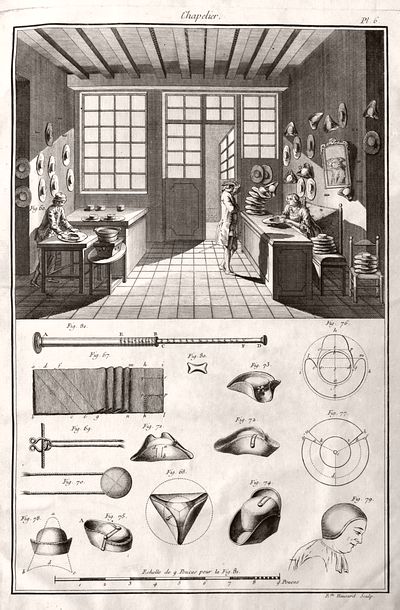Balch was born into an old New England family in Boston, baptized at the New South Meetinghouse. In May 1760 he was admitted as a freeman in Rhode Island, living in Providence. An advertisement in the 15 Oct 1763 Providence Gazette called him “Capt. Nathaniel Balch” and said he was established at “the Sign of the Hat.”
Balch didn’t sell just hats, though. On 7 Jan 1764 he offered “enamell’d Stone Ware”; glassware; pipes “by the Box, Gross, or Dozen”; snuff; pepper and other spices; cheese; and “the very best Hyson Tea,” all “as cheap as they can be purchased in Boston.”
Not to mention “Choice new Philadelphia Flour,” chocolate, brown sugar, “Melasses,” rum, shoes from Lynn, and tickets to lotteries authorized by both Massachusetts and Rhode Island. Along with, of course, “FELT and CASTOR HATS.”
According to Dr. Galusha B. Balch’s Genealogy of the Balch Families in America (1897), Nathaniel married Mary Fletcher, a distant cousin, on 26 May 1763. Their oldest child, Nathaniel, Jr., was born in Providence on 26 Feb 1764. (This genealogy contradicts itself by stating elsewhere that all of Nathaniel and Mary’s children were born in Boston.)
The Balches lived in a “Two-Story Dwelling-House…at the North End of the Town…fronting two Streets.” Balch wrote: “It has an excellent Cellar, two commodious Shops, with a small Garden adjoining, whereon stands a large Store, Stable, Wood-House, and Chaise-House.” Of course, he was trying to sell the property at the time.
In May 1764, Balch began to advertise for customers to settle their balances with him. In January 1765 he put his house on the market, and in May he announced that “he purposes to leave the Colony in a few Days.” The Balches returned to Boston in time for the birth of their second son, William, on 11 July 1765.
Back in his home town, Balch first worked out of “Mr. Bligh’s Shop in Marlborough Street” before moving to “Mr. John Langdon’s in Fore Street, near the Draw-Bridge” over the creek that separated the North End from the central district. On 14 July 1766 he advertised:
The best, Beaver, Beaveret, Castor and Felt Hats, of his own make.The March 1767 Boston town meeting elected Nathaniel Balch a Clerk of the Market, a beginning-level town office that showed he had the respect of his neighbors. He didn’t seek higher office at this time, though.
Also a compleat Assortment of Glass, China and Delph Ware, French Indigo, Flask Oyl, Spices of all sorts, Allum, Copperas, Mustard, Poland Starch, Stone blue, House Brushes, Salt Petre, Isinglass, Kippen’s Snuff, Jappan’d Ware, Mahogany Trays and Tea Chests, Sugar Canisters, Baskets for China, Knives and Bread, Knives and Forks, Shoe Buckles, Candlesticks, Snuff Boxes, Pipes, Figs, Currants, best Hyson and Bohea Tea, Coffee and Chocolate, Loaf and Brown Sugar, and many other Articles all Cheap for Cash.——
At the end of 1770 Balch moved from Fort Street to Cornhill, right in the center of town. From that point until 1774 his advertisements were all about hats:
Best Beaver and Beaveritt Hatts,Balch’s ads appeared in the Boston News-Letter, the newspaper that supported the royal government but also had the most genteel readership. He was clearly establishing himself.
of his own make, cock’d in the newest Taste, genteel white riding Hatts for Ladies and Gentlemen, Children’s round turn-up Hatts or Whimseys, both black and white of all Prices, Felt Hatts of all Sorts. Also, an Assortment of Hatters Trimmings.
But I don’t think Balch’s heart was really in hatmaking.
TOMORROW: A natural entertainer.

No comments:
Post a Comment